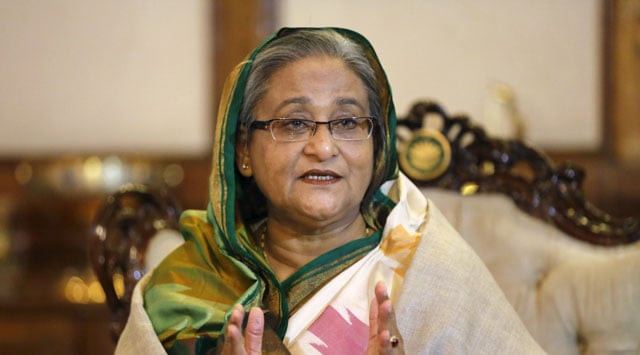Bangladesh leader Hasina's gains from shock hangings seen short-lived
Analysts and opposition leaders warn executions sent signal that violence is only political tool that works

Bangladesh's Prime Minister Sheikh Hasina speaks during a media conference in Dhaka in this January 6, 2014 file photo. PHOTO: REUTERS
Political analysts and opposition leaders warned that the executions sent a signal that violence is the only political tool that works. The shock felt by an opposition which has already suffered mass arrests may be replaced by further bloodshed.
Ali Ahsan Mohammad Mujahid and Salahuddin Quader Chowdhury were hanged on Sunday for crimes against humanity during the 1971 war to break away from Pakistan.
Pakistan voices anguished concern at Dhaka hangings
Protests against the hangings were muted. A general strike was called on Monday by Mujahid's Jamaat-e-Islami party, but there were no processions in Dhaka to back the strike and the day was largely peaceful in a country when strikes often turn violent. Chowdhury was a legislator in former premier Khaleda Zia's Bangladesh Nationalist Party (BNP).
"Hasina's popularity has soared because of the overwhelming support of the people in favour of trials and execution of war criminals," said HT Imam, Hasina's political adviser. "The policy of the government is zero tolerance against terrorism or violence, be it religious or any other kind."
Badiul Alam Majumdar, secretary of rights group Citizens for Good Governance, said Hasina had been getting stronger because she did not have any visible opposition. "The absence of democracy only creates room for extremism," he said.
Muslim-majority Bangladesh has seen a rise in religious violence in recent months, with two foreigners and four secular writers and a publisher killed this year.
Bangladesh to hang opposition leaders in hours
Just a few hours before the Supreme Court rejections of the opposition leaders' appeals on Wednesday last week, an Italian priest and medic was shot and wounded in the latest attack on foreigners in Bangladesh.
The Islamic State has claimed responsibility for the attacks on the foreigners, but the government has blamed the rising violence on political opponents. Tensions are high in Dhaka. Foreigners avoid walking in the streets, even in the relatively more secure Gulshan diplomatic area.
The crucial $25 billion garment export sector has been nervous. Last month, executives from global clothing giants H&M, Inditex and Gap cancelled trips to Dhaka after the killings of foreigners.
Last week, some writers due to attend the Dhaka literature festival skipped the event. Foreigners who came drove in and out of the venue, where security was beefed up.
Some Bangladeshis feel that the executions of people convicted of war crimes provides some sense of justice, but they said the uncertainty of what fundamentalist groups might do in retaliation was scary.
Bangladesh opposition leaders on death row seek pardon
"The fears of public intellectuals, opposition political leaders and ordinary people will increase," said Ataur Rahman, chairman of the Centre for Governance Studies in Dhaka.
Hardliners have denounced the trials as a politically motivated campaign. Abul Barkat, an economics professor at Dhaka University, said backlash from such groups had become more likely after the executions.
Muhammad Osman Farruk, a BNP leader, called the increase in violence "ominous". "This has further heightened the need for the government of the day to rise above all partisan and sectarian considerations and reach out to all sections of the people to forge national unity and reconciliation," Farruk said.



















COMMENTS
Comments are moderated and generally will be posted if they are on-topic and not abusive.
For more information, please see our Comments FAQ